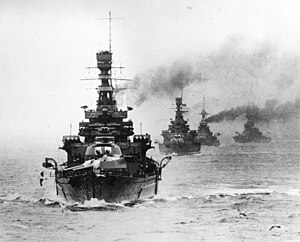HMS Repulse (1916)

HMS Repulse on manoeuvres in the 1920s
|
|
| History | |
|---|---|
|
|
|
| Name: | HMS Repulse |
| Ordered: | 30 December 1914 |
| Builder: | John Brown & Company, Clydebank, Scotland |
| Laid down: | 25 January 1915 |
| Launched: | 8 January 1916 |
| Commissioned: | 18 August 1916 |
| Motto: |
|
| Nickname(s): | Repair |
| Fate: | Sunk on 10 December 1941 by Japanese air attack off Kuantan, South China Sea |
| General characteristics (1916) | |
| Class and type: | Renown-class battlecruiser |
| Displacement: |
|
| Length: | |
| Beam: | 90 ft 1.75 in (27.5 m) |
| Draught: | 27 ft (8.2 m) |
| Installed power: | 112,000 shp (84,000 kW) |
| Propulsion: |
|
| Speed: | 31.5 knots (58.3 km/h; 36.2 mph) |
| Crew: |
|
| Armament: |
|
| Armour: |
|
| General characteristics (1939) | |
| Displacement: | 34,600 long tons (35,200 t) |
| Length: | 794 ft 2.5 in (242.1 m) (o/a) |
| Beam: | 89 ft 11.5 in (27.4 m) |
| Draught: | 29 ft 8 in (9.0 m) |
| Installed power: | 112,000 shp (84,000 kW) |
| Propulsion: | 4 × shafts, 4 × direct-drive steam turbines |
| Speed: | about 31 knots (57 km/h; 36 mph) |
| Range: | 3,650 nmi (6,760 km; 4,200 mi) |
| Complement: | 1,181 |
| Armament: |
|
| Armour: | |
| Aircraft carried: | 4 × seaplanes |
| Aviation facilities: | 1 × double-ended aircraft catapult |
HMS Repulse was a Renown-class battlecruiser of the Royal Navy built during the First World War. Originally laid down as an improved version of the Revenge-class battleships, her construction was suspended on the outbreak of war because she would not be ready in a timely manner. Admiral Lord Fisher, upon becoming First Sea Lord, gained approval to restart her construction as a battlecruiser that could be built and enter service quickly. The Director of Naval Construction (DNC), Eustace Tennyson-D'Eyncourt, quickly produced an entirely new design to meet Admiral Lord Fisher's requirements and the builders agreed to deliver the ships in 15 months. They did not quite meet that ambitious goal, but the ship was delivered a few months after the Battle of Jutland in 1916. Repulse, and her sister HMS Renown, were the world's fastest capital ships upon completion.
Repulse participated in the Second Battle of Heligoland Bight in 1917; the only combat she saw during the war. She was reconstructed twice between the wars; the 1920s reconstruction increased her armour protection and made lesser improvements, while the 1930s reconstruction was much more thorough. Repulse accompanied the battlecruiser HMS Hood during the Special Service Squadron's round-the-world cruise in 1923–24 and protected international shipping during the Spanish Civil War in 1936–39.
The ship spent the first months of the Second World War hunting for German raiders and blockade runners. She participated in the Norwegian Campaign of April–June 1940 and searched for the German battleship Bismarck in 1941. Repulse escorted a troop convoy around the Cape of Good Hope from August to October 1941 and was transferred to East Indies Command. She was assigned in November to Force Z which was supposed to deter Japanese aggression against British possessions in the Far East. Repulse and her consort Prince of Wales were eventually sunk by Japanese aircraft on 10 December 1941 when they attempted to intercept landings in British Malaya.
...
Wikipedia
